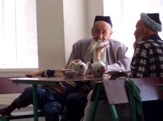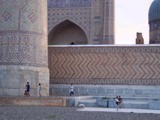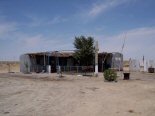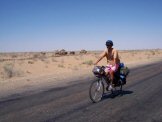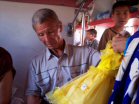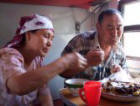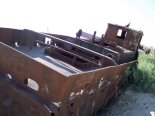|
 July 19 July 19
On the Silk Route
Tashkent, the end of the road, is a little less than 600 kilometres from here. Odessa seems a long, long way away… It feels like the end of the journey is nigh and
I realise how incredibly lucky I am to have travelled over Europe and into Asia simply by the power of my own two legs, with the time to savour even the most minor change of
scenery or culture… What, if anything, does the Ukraine, with its beautiful Orthodox churches, have in common with Boukhara, from where I am writing this, with its mosques that
date back several centuries? Perhaps the fact that these religious buildings are never very full, that this summer's Russian hits still resound in my ears from time to time and
that people understand the Russian language even here?
But that's about all. Sometimes, certain kilometres take you further than others. Since crossing the border into Kazakhstan, I have cycled practically exclusively through desert,
as if to demonstrate the gulf that separates Slavic Europe from Central Asia.
And so, for the last four days, we have crossed through the desert, deep in the heart of Uzbekistan. The July sun makes this physically very difficult, even though we avoid
travelling between midday and 4 p.m., we take a break in the little restaurants we come across here and there all over the desert. By stopping at different places along the Silk
Route, we have probably followed the same paths as traders at the beginning of the last millennium. After Khiva, we are now in Boukhara, and soon, we'll reach Samarkand.
In all these towns, there are lots of medersas, mosques, mausoleums and, therefore, lots of tourists.
As for the local population, here in Boukhara (as in Samarkand), the people are originally Tadjik. Neighbouring Tadjikistan isn't exactly happy about the fact that it lost these
most prestigious cities after the Soviets carved up the region back in 1924.
The local Tadjiks use a dialect that has very little in common with the language spoken in the "motherland". While not terribly well thought of there, here they have to deal with a
rather insidious form of rivalry with the native Uzbeks. In spite of this, they are becoming more and more assimilated with the Uzbeks and many even describe themselves as Uzbek,
and have Uzbekistan registered as their ethnic origin on their passports.
This is one contradiction that I can't quite understand. The authorities undoubtedly encourage them to do that. It should be said that the only real difference is the language
spoken. Their religion, clothes (the women wear multicoloured dresses) and customs are the same.
The women are not exactly avant-garde. One 20-year old Tadjik woman explained to us that women are expected to obey their husbands or parents. Hers are very strict and there is no
way she is allowed out on her own after 7 p.m., let alone go clubbing (the only women who go to clubs are, she said, Russian). She has never been to Samarkand or Khiva: "I can't go
without my parents and they never have time to take me. When I get married, perhaps I'll go with my husband." Although still single, she expects to get married next year.
However, being a woman is not all gloom and doom. Our young friend has already had one boyfriend and has rejected proposals from several of her friends at university. And don't
forget, women here don't wear the veil, they work and have a voice…
|
![]()
![]()
![]()

